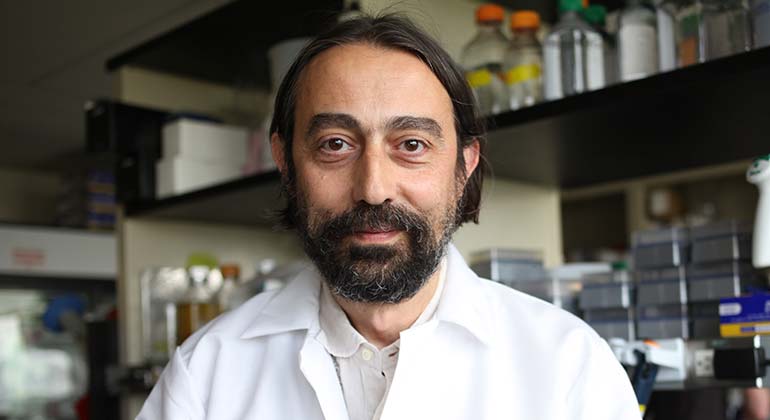Young Immunology Researchers Receive Prestigious Grant For Outstanding Discoveries
Benjamin tenOever, PhD, and Julie Magarian Blander, PhD, each received a grant from the Burroughs Wellcome Fund for their pioneering work in the study of infectious diseases
Julie Magarian Blander, PhD, Associate Professor of Medicine, and Benjamin tenOever, PhD, Associate Professor of Microbiology at Mount Sinai School of Medicine, have been honored with prestigious Burroughs Wellcome Fund Awards for their pioneering research in infectious diseases. The five-year, $500,000 awards are given to accomplished investigators to study the development of disease, with a focus on the intersection of human and microbial biology. Drs. tenOever and Blander were chosen among 166 applicants in the infectious disease category. Mount Sinai was the only participating research center with two award recipients.
"Mount Sinai is renowned for attracting stellar veteran scientists from around the world, and we are also committed to encouraging our young scientists to make their mark early in their careers," said Dennis. S. Charney, MD, Anne and Joel Ehrenkranz Dean of Mount Sinai School of Medicine and the Executive Vice President for Academic Affairs of The Mount Sinai Medical Center. "The Burroughs Wellcome Fund is highly selective in evaluating potential grant recipients. This is truly an honor for Drs. tenOever and Blander, and the Mount Sinai community as a whole."
Dr. tenOever’s research focuses on the molecular biology of virus infection, specifically the intricacies governing the cell’s response to infection, and the subsequent exploitation of that knowledge to generate novel strategies for vaccine and antiviral drug design. He has also expanded his research to include the role of micro RNAs in the cellular response to virus infection. Dr. tenOever is a 2008 Pew Scholar, a Presidential Early Career in Science Award winner, and the recipient of the American Society for Microbiology’s 2010 Young Investigator Award. His most recent research received the Cozzarelli prize in Biological Sciences, an honor awarded to papers that reflect scientific excellence and originality.
"Dr. tenOever is a highly productive scientist who built a very successful group here at Mount Sinai," said Peter Palese, PhD, Horace W. Goldsmith Professor and Chair, Department of Microbiology, Mount Sinai School of Medicine. "I look forward to seeing many more important discoveries from his research."
Dr. Blander, whose research was recently published in Nature, made the surprising discovery that the immune system has the capacity to sense microbial viability by sensing whether these microbes were dead or alive. This realization provides a simple explanation for the long standing puzzle of why live, attenuated vaccines are more effective than their dead counterparts. The finding could lead to the creation of a new generation of vaccines that combine the safety of a dead vaccine with the efficacy of a live vaccine. As Director of the Innate Immunity Research Program, Dr. Blander was named a Searle Scholar in 2007 and has received grants from the National Institutes of Health and the American Cancer Society; and several awards from Mount Sinai School of Medicine, including a 2010 Harold and Golden Lamport Award for basic research, and the 2011 MSSM Faculty Council Junior Faculty Award for Academic Excellence.
"We have always known that Dr. Blander is a rising star in the immunology community," said Lloyd Mayer, MD, Professor and Co-Director of the Immunology Institute, Dorothy and David Merksamer Professor of Medicine, and Professor of Microbiology at The Mount Sinai Medical Center. "Dr. Blander seeks to unravel the link between innate and adaptive immunity in a unique way."
According to the Burroughs Wellcome Fund, the awards are intended to give recipients the freedom and flexibility to pursue new avenues of inquiry and higher-risk research projects that hold potential for advancing significantly the biochemical, pharmacological, immunological, and molecular biological understanding of how infectious agents and the human body interact.
About The Mount Sinai Medical Center
The Mount Sinai Medical Center encompasses both The Mount Sinai Hospital and Mount Sinai School of Medicine. Established in 1968, Mount Sinai School of Medicine is one of few medical schools embedded in a hospital in the United States. It has more than 3,400 faculty in 32 departments and 15 institutes, and ranks among the top 20 medical schools both in National Institute of Health funding and by U.S. News & World Report. The school received the 2009 Spencer Foreman Award for Outstanding Community Service from the Association of American Medical Colleges.
The Mount Sinai Hospital, founded in 1852, is a 1,171-bed tertiary- and quaternary-care teaching facility and one of the nation's oldest, largest and most-respected voluntary hospitals. U.S. News & World Report consistently ranks The Mount Sinai Hospital among the nation's best hospitals based on reputation, patient safety, and other patient-care factors. Nearly 60,000 people were treated at Mount Sinai as inpatients last year, and approximately 530,000 outpatient visits took place.
For more information, visit http://www.mountsinai.org/.
Find Mount Sinai on:
Facebook: http://www.facebook.com/mountsinainyc
Twitter @mountsinainyc
YouTube: http://www.youtube.com/mountsinainy
About the Mount Sinai Health System
Mount Sinai Health System is one of the largest academic medical systems in the New York metro area, with 48,000 employees working across eight hospitals, more than 400 outpatient practices, more than 600 research and clinical labs, a school of nursing, and a leading school of medicine and graduate education. Mount Sinai advances health for all people, everywhere, by taking on the most complex health care challenges of our time—discovering and applying new scientific learning and knowledge; developing safer, more effective treatments; educating the next generation of medical leaders and innovators; and supporting local communities by delivering high-quality care to all who need it.
Through the integration of its hospitals, labs, and schools, Mount Sinai offers comprehensive health care solutions from birth through geriatrics, leveraging innovative approaches such as artificial intelligence and informatics while keeping patients’ medical and emotional needs at the center of all treatment. The Health System includes approximately 9,000 primary and specialty care physicians and 11 free-standing joint-venture centers throughout the five boroughs of New York City, Westchester, Long Island, and Florida. Hospitals within the System are consistently ranked by Newsweek’s® “The World’s Best Smart Hospitals, Best in State Hospitals, World Best Hospitals and Best Specialty Hospitals” and by U.S. News & World Report's® “Best Hospitals” and “Best Children’s Hospitals.” The Mount Sinai Hospital is on the U.S. News & World Report® “Best Hospitals” Honor Roll for 2024-2025.
For more information, visit https://www.mountsinai.org or find Mount Sinai on Facebook, Twitter and YouTube.

